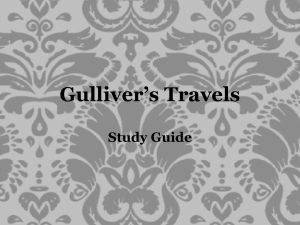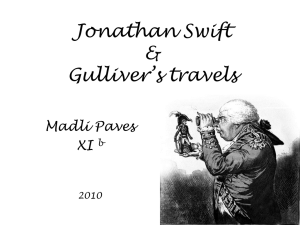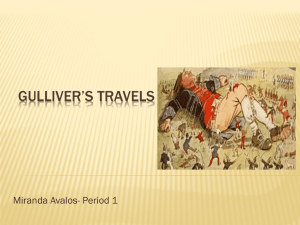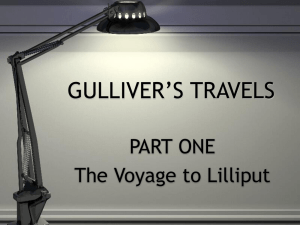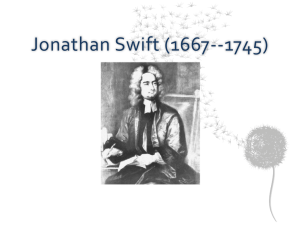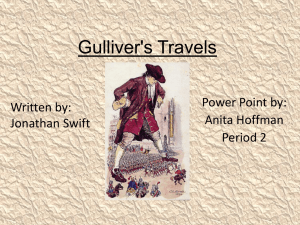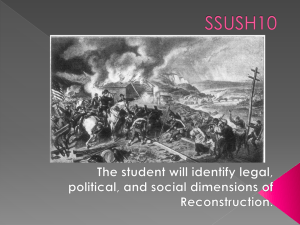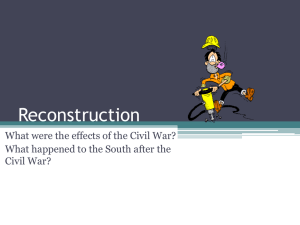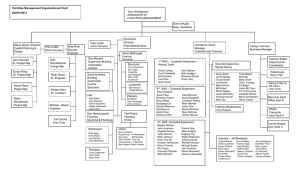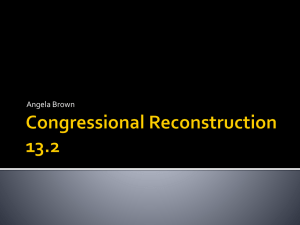Age of Reason
advertisement
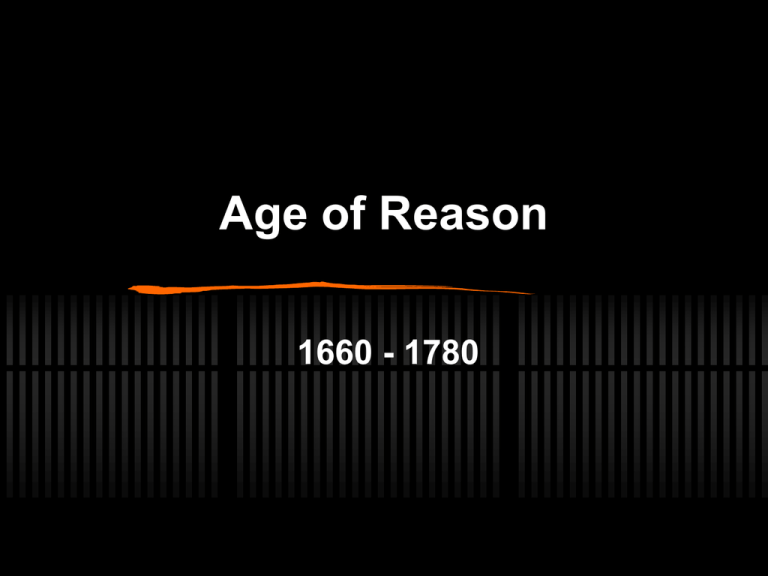
Age of Reason 1660 - 1780 I. Introduction A. The late seventeenth and eighteenth centuries in Europe were marked by a general intellectual and literary movement known as the Enlightenment. This movement was characterized by Rationalism, a philosophy that emphasized the role of reason rather than sensory experience or religion / faith to answer the basic questions of human experience. I. Introduction B. In this age, people were concerned with manners and morals, understanding themselves , their world, and their relations with one another. C. This period was influenced by John Locke’s Essay Concerning Human Understanding (1690) which argued “Our business here is not to know all things, but those which concern our conduct.” I. Introduction D. This period was also stimulated by the discoveries of Isaac Newton, whose Principia, set forth the laws of gravitation, and advocated the use of the scientific method to test old theories and develop new knowledge. II. The Early Years (1660 – 1700) A. In 1660 the Puritan regime was toppled and King Charles II took back the English throne. This event became known as the Restoration. B. The Restoration reinstituted the Anglican Church as the established church, and the Puritans were ousted from both government and church positions. II. The Early Years (1660 – 1700) C. In 1662 Charles II chartered the Royal Society which required the use of the scientific method in all of its investigations. II. The Early Years (1660 – 1700) D. As a result of Charles II and James II Catholic leanings, secret negotiations took place allowing Protestant William and Mary to take the throne of England. Because their installment took place without bloodshed, it was called the Glorious Revolution. As a condition of their rule, they accepted a Bill of Rights that limited the power of the crown and reaffirmed the supremacy of Parliament. II. The Early Years (1660 – 1700) E. For centuries London had been growing in population and importance. It also suffered two major disasters in quick succession: 1. the Plague of 1665, which killed 70,000 people and 2. the Great Fire of London in 1666, which lasted five days, and resulted in the homelessness of 2/3 of London’s population. II. The Early Years (1660 – 1700) F. In 1652, the opening of the first coffeehouses in London provided a place where men could meet their friends, drink coffee, smoke and talk about politics, social theory, business, etc. II. The Early Years (1660 – 1700) G. Major changes in literature took place during these years: 1.Ben Johnson’s use of classical models 2.Love sonnets were replaced by satirical verses aimed at correcting individuals and society 3.Writing in general became less ornate 4.Literary periodicals became the vogue for the middle class 5.In drama, actresses played female roles for the first time III. The Middle Years (1700 – 1744) A. After Queen Anne died without an heir, George I, from the German Hanover line of the Royal family, was installed and was acceptable to Parliament primarily because he was Protestant. With this change in the monarchy, there was a growth in the power of the prime minister and his cabinet. III. The Middle Years (1700 – 1744) B. England’s two political parties at this time were the Tories, who favored royal power and the established Church of England, and the Whigs who favored reforms, progress, and parliamentary rather than royal power. III. The Middle Years (1700 – 1744) C. The middle class moved into a position of social dominance during the early part of the century. The working class also grew as a result of new jobs in construction, mines and factories—all of which resulted in the Industrial Revolution . D. However, the working class benefited little from England’s new riches. In London the inequality in the distribution of wealth was appalling. III. The Middle Years (1700 – 1744) E. The growing influence of the middle class on literature, who were now able to read for pleasure, caused new types of literary works to be produced. Middle class readers preferred to read about people like themselves; so tragedies gave way to realistic novels like Pamela and Tom Jones. F. Literary periodicals like The Spectator were becoming popular with the middle-class coffeehouse audience. They were written to entertain readers at the same time improve their morals and manners. III. The Middle Years (1700 – 1744) G. Perhaps the greatest moralist of all was Jonathan Swift His writings exposed and ridiculed the social and political evils of the day. In Gulliver’s Travels his chief targets were governmental and personal hypocrisy and vice. IV. The Late Years (1744 – 1780) A. George III took the throne in 1760 and was the first Hanoverian English king to be born in England and speak English as a first language. Unlike his two predecessors, he supported the Tory party. IV. The Late Years (1744 – 1780) B. The great man of letters during this period was Samuel Johnson. His three major projects were: 1.a comprehensive English dictionary; 2.editing a complete edition of Shakespeare’s works; and 3.critical biographies of 52 English poets. IV. The Late Years (1744 – 1780) C. Though many of the ideas and literary styles of the Age of Reason lasted until the end of the century, literary forerunners of the coming Romantic age were visible in the late 1700s (namely, Thomas Grey whose writing dealt with feelings, wild and natural landscapes, and folk poetry of the common people.) Samuel Pepys (1633 – 1703) He was an important writer due to his private 10 year diary, which includes not only records of public events (ex. The Great Plague and The Fire of London), but also his most private thoughts and actions. Reading Pepys’ diary gives the reader a sense of history in the making and then of Pepys’ reaction to it. Samuel Pepys (1633 – 1703) The Great Fire of London destroyed more than 13,000 houses, plus other buildings, including 89 churches. Miraculously, only 6 people died in the fire, but over 250,000 were left homeless. One positive outcome of the fire was that London was never again struck by the plague because the fire destroyed the rats that carried the disease. Samuel Pepys (1633 – 1703) Literary Term: Diary: a record of daily happenings written by a person for his/her own use. The diarist is moved by a need to record daily routine and confess innermost thoughts. The diary makes up in immediacy and frankness what it lacks in artistic shape and coherence. Samuel Pepys (1633 – 1703) Note: Pepys’ diary shows that the Londoner’s helped each other and generally remained calm throughout this 17th century catastrophe. Merchants, however, took advantage of the situation by increasing their prices (price gouging). Compare to contemporary tragedies and natural disasters (Hurricane Andrew / 9/11 Disaster / Hurricane Katrina) Neighbors helped neighbors People mostly remained calm Merchant prices hiked (Hurricane Andrew, but not 9/11 due to emergency legislation and government warnings against price gouging). From The Diary by Samuel Pepys 1. From whom did Pepys first learn of the fire? He learned of the fire from Jane, his maid. 2. Where did Pepys first go to get a better view of the fire? To the Tower of London From The Diary by Samuel Pepys 3. Look at the map on page 327. About how far is it from Pepys’s house to the Tower of London? About 1/8 of a mile 4. As he is traveling by boat, what does he see people doing with their belongings? They are flinging them into the river, or putting them on small boats (lighters) From The Diary by Samuel Pepys 5. What does he write about the pigeons? He sees they are confused about leaving their nests. Sometimes they stay too long, burn their wings and fall down. 6. What natural force drives the fire further into the city? The wind From The Diary by Samuel Pepys 7. He sees that no one is trying to put out the fire and decides to go to Whitehall. How doe he travel there? By boat 8. He is called before the King and the Duke of York to tell them what he has seen. What advice does he give to the King? To tear down the houses that lie in the path of the fire to try to stop the fire From The Diary by Samuel Pepys 9. How do you know that the King and the Duke of York trust and respect Pepys? Because he is given commands from both to deliver to the Lord Mayor of London 10. How does the Lord Mayor respond to the King’s message? He says the people will not obey him; he has been pulling down houses, but it does no good; he is exhausted because he has been up all night. From The Diary by Samuel Pepys 11. Pepys returns home, dines, and then goes out again to observe the fire. When it is almost dark, he returns home “with a sad heart.” Toward the end of this day’s entry, what does he say he is forced to do? To begin to pack up his own household goods 12. What possessions does Pepys move to his cellar and his office? He moves his money and iron chests to the cellar and his bags of gold and papers to his office From The Diary by Samuel Pepys 13. Where does Pepys take his money and best things? How does he get them there? To Sir W. Rider’s home; he gets them there by cart 14.What is a lighter and how does Pepys plan to use one? A lighter is a small, flat-bottomed boat; he plans to use one to take away the rest of his belongings From The Diary by Samuel Pepys 15. On September 4, how does Pepys protect his papers, wine, and Parmesan cheese? He digs a pit and puts the things in it 16. What method is used to attempt to stop the fire? Blowing up houses and quenching whatever fire remains after the explosion From The Diary by Samuel Pepys 17. What is referred to by “Paul’s” and what happens to it? St. Paul’s Cathedral; it burns 18.When do Pepys and his wife finally leave their house? September 5, early in the morning From The Diary by Samuel Pepys 19. What rumors about the origin of the fire have arisen? That it had been started by the French 20. Are Pepys’s house and office burned? Explain. No. The blowing up of houses saves them. From The Diary by Samuel Pepys 21. What item does Pepys pick up from the street? A melted piece of glass from Mercer’s Chapel 22. What effect has the disastrous fire had on the cost of housing? It raised the costs tremendously, because there are so few houses left From The Diary by Samuel Pepys 23. According to Pepys, what dispute foretells the rebuilding of London? The dispute over w here the custom house should be built foretells the rebuilding of London 24. What qualities of Pepys’s have been revealed through his actions during the fire? He is energetic and untiring in the disaster; he is a valuable source of communication because he is accurate and trustworthy Jonathan Swift 1667 – 1745 1. Swift is England’s greatest prose satirist Prose - ordinary form of spoken or written language, without metrical structure, as distinguished from poetry or verse. Satire - the use of irony, sarcasm, ridicule, or the like, in exposing, denouncing, or deriding vice, folly, etc. Jonathan Swift 2. Of his satire he wrote, “the chief end I propose to myself in all my labors is to vex the world rather than divert it.” Vex - to irritate; annoy; provoke/ to discuss or debate (a subject, question, etc.) with vigor or at great length: to vex a question endlessly without agreeing. / to disturb by motion; stir up; toss about. Divert - to distract from serious occupation; entertain or amuse. Jonathan Swift 3. Although his parents were English, he was born, educated and spent most of his life in Ireland. 4. He became an ordained Anglican priest and took a serious interest in Irish political problems with England. Anglican Church is the Church of England (as opposed to Roman Catholicism) Jonathan Swift 5. In 1724 he published a series of satirical letters that seriously criticized an English plot to devalue Irish currency. The English government was so angry about the letters that they offered an award of 300 pounds ($584.70) for the name of the author. No one revealed Swift’s identity. 6. Swift’s satirical masterpiece is Gulliver’s Travels. He published it anonymously in 1726, and it became an immediate success in England. Jonathan Swift 7. This story is written in the form of a travel journal divided into four sections, each of which describes a different voyage of the ship’s doctor, Lemuel Gulliver. In each section he visits a different fantastical society and records the facts and customs of the country. 8. Through Gulliver’s adventures and observations, Swift aims his savage satire against the English people generally, the Whig party, against various political, academic and social institutions, and finally, against man’s constant abuse of his greatest gift, reason. Jonathan Swift 9. Swift observed and knew human nature well. He loved people as individuals; but when they changed into groups, he hated them, satirized them, and tried to sting them into realizing the dangers of the herd mentality. Jonathan Swift Literary Terms: Satire – literary technique that uses wit to ridicule a subject, usually some social institution or human foible, often with the intention to inspire reform. Jonathan Swift Point of View – the vantage point from which an author presents the actions and characters of a story. The author chooses a particular point of view to achieve certain effects. The major points of view are: a.First Person – I, me, my, we, us b.Second Person- you, your c.Third Person – he, she, it, they, 1.Omniscient 2.Limited Omniscient Gulliver’s Travels is told from the first person point of view (i.e. Gulliver is the narrator of his travel journal). A Voyage to Brobdingnag, from Gulliver’s Travels 1. Where is Gulliver when the story opens? On a ship that is anchored off an unknown island or continent 2. Who appears to inhabit the island? Giants A Voyage to Brobdingnag, from Gulliver’s Travels 3. What surprises Gulliver about the grass? Its length of 20 feet 4. Gulliver recalls his adventures to Lilliput, the country of the tiny people. What conclusion about size does Gulliver make? He concludes that “nothing is great or little otherwise than by comparison.” A Voyage to Brobdingnag, from Gulliver’s Travels 5. One of the reapers finds Gulliver and takes him to his master, the farmer. When they first see Gulliver, do the farmer and, later, his wife believes him to be a rational creature? Explain. No. The farmer places Gulliver on the ground on all fours, like an animal. The wife screams and jumps back as if he were a toad or a spider. Later, yes, because they communicate. A Voyage to Brobdingnag, from Gulliver’s Travels 6. Why do the King’s scholars believe Gulliver “could not be produced according to regular laws of nature? They believe he has no means to defend himself (something unheard of in nature), would not be able to get food for himself, and they don’t know how to classify him. 7. List three things that emphasize how small Gulliver is in comparison with the people of Brobdingnag. Smaller than a dwarf; attacked by wasps; flies, etc A Voyage to Brobdingnag, from Gulliver’s Travels 8. Why are the Queen’s eating habits disturbing to Gulliver? She eats great amounts of food, bones and all, with huge terrifying silverware 9. How does Gulliver spend the Sabbath with the King and Queen? He spends it telling the King of the “manners, religion, laws, government, and learning of Europe.” A Voyage to Brobdingnag, from Gulliver’s Travels 10. What does the King find humorous about Gulliver’s stories of his country? He finds it amusing that human life could be imitated by ‘such diminutive insects’ 11. What plagues Gulliver at Court and is a source of fearfulness? Great flies the size of birds A Voyage to Brobdingnag, from Gulliver’s Travels 12. What does he attack with his sword? Wasps the size of partridges 13. What is Gulliver’s most dangerous adventure at Court? His encounter with a monkey A Voyage to Brobdingnag, from Gulliver’s Travels 14. How is he rescued? A boy climbs up, puts him in his pocket, and carries him to safety 15. What items does Gulliver make using the Queen’s hair? Two cane chairs and a purse A Voyage to Brobdingnag, from Gulliver’s Travels 16. How is Gulliver able to listen to the Brobdingnagian music? He can listen to the music only by moving his box far from the concert and closing its doors, windows, and curtains 17.How is Gulliver able to play the giant spinet (a small upright piano)? He runs sideways on the bench and hits the keys with two specially built cudgels (kuhj-uhl] (a short, thick stick used as a weapon; club) A Voyage to Brobdingnag, from Gulliver’s Travels 18. Based on Gulliver’s stories, what qualities did the King conclude were necessary for a legislator? Ignorance, idleness and vice 19.To what does Gulliver attribute the King’s conclusions about Gulliver’s country? To the King’s relative seclusion and consequent narrowness of thinking A Voyage to Brobdingnag, from Gulliver’s Travels 20.What does Gulliver do to try to ingratiate himself with the King? He offers to teach him how to make gunpowder 21.What is the King’s reaction to Gulliver’s offer? He is horrified, and says that an enemy of mankind must have invented it. A Voyage to Brobdingnag, from Gulliver’s Travels 22. What is it that Gulliver longs to see? The ocean 23. What happens to Gulliver and his box while in the care of the page? The page leaves him alone and an eagle flies away with the box. In a quarrel with another eagle, the eagle drops the box into the sea near a British ship. The box is picked up by the sailors and Gulliver is rescued. A Voyage to Brobdingnag, from Gulliver’s Travels 24.Gulliver attributes the King’s lack of interest in making gunpowder to “narrow principles and short views.” What does that reveal about the society Gulliver represents? Gulliver comes from a society that is so obsessed with dominion and control through violence that Gulliver cannot imagine any other reasonable alternative behavior. A Voyage to Brobdingnag, from Gulliver’s Travels 25. How does that society contrast the Brobdingnagian society? In contrast, the Brob. Society was characterized by respect and loyalty to their king, who in turn was a wise, nonviolent leader. Samuel Johnson 1709 – 1784 1. Samuel Johnson was a famous English lexicographer (one who writes, compiles, or edits a dictionary), essayist, poet, and moralist, and generally accepted as the major English literary figure of the second half of the 18th century. 2. In 1738 he published his poem London, which is marked with the pessimism that pervaded his life. Samuel Johnson 3. Johnson’s core moral values and central theme can be summed up as a strong belief in the vanity of human wishes and the impossibility of human happiness in an imperfect world. 4. Johnson’s literary style is balanced, pithy (brief, forceful, and meaningful in expression), and one of the finest examples of English prose. Samuel Johnson 5. In person, Johnson was admittedly slovenly, abrupt in manner and even rude. He was often driven by fears of insanity and damnation, and also suffered from hypochondria. 6. Yet the biography written about him by close friend and colleague, Mr. Boswell, shows Johnson to be a man of great kindness, generosity and sociability. Samuel Johnson 7. Johnson loved and cultivated the art of conversation; he admitted that he sometimes talked just for the sake of victory over his verbal opponents in men’s clubs and coffee houses. From London 1. What problem in the city of London does Johnson cite in line 1? Crimes of all sorts are occurring in large numbers 2. What is the only “crime” that is not “safe” in London? Poverty From London 3. What is the effect of the repetition of “This, only this” in lines 3-4? It emphasizes the author’s opinion that the poverty-stricken are unfairly treated and even punished 4. According to Johnson, what are the “griefs…most bitter” that must be endured by the poverty-stricken? They must endure scornful jests and insults of others From London 5. To what class of society do the “blockheads” of line 12 belong, according to the poem? To the upper, wealthier classes 6. Why does Johnson say, “Prepare for death, if here at night you roam, / And sign your will before you sup from home”? He says that because of the dangers of going out into the London streets at night From London 7. Who are the “Lords of the street and terrors of the way?” The “fiery fop” of Line 15 (a fop is a man who is excessively vain and concerned about his dress, appearance, and manners) and the “frolic drunkard” of Line 17 are among those who make the streets dangerous 8. Who do the lords of the street prey upon? The poor From London 9. In lines 25 - 30, what danger at home does Johnson identify for those who have survived the passage through the streets? He says that it is not unlikely that one could be murdered while sleeping by someone who breaks into the house 10.What official body does Johnson address in lines 33 – 36? The House of Commons; Parliament From London 11.What is the tone of these lines? Ironic From the Dictionary of the English Language 1. What does Johnson reveal about himself through his definition of dull? His sense of humor and the ability to laugh at himself are revealed. 2. List at least two dictionary entries in which Johnson makes political comments Excise, pension, pensioner, Tory, Whig From the Dictionary of the English Language 3. What prejudice of Johnson’s is displayed in his definition of oats? His prejudice against Scotland and its people are displayed 4. Which definition carries an ironic reference to Johnson’s work? Lexicographer From the Dictionary of the English Language 5. Johnson calls gambler a cant word. What does he mean by this? (Look up cant in the Glossary.) The peculiar language of a special group, using many strange words •6. How have the definitions of fun and lunch changed since Johnson’s time? The word ‘fun’ is no longer considered a cant word. ‘Lunch’ now means a light meal between breakfast and dinner. From the Dictionary of the English Language 7. What is the tone of Johnson’s definitions of pension and pensioner? He uses an ironic tone for satirical purposes. 8.List at least two examples of definitions which illustrate Johnson’s thoroughness. Alligator, bully, curtail, shrewmouse From the Dictionary of the English Language 9. Which dictionary entry is in error, according to the footnote? Pastern 10. Look up the word itch in a current edition of a dictionary. How does it differ from Johnson’s definition? Answers will vary Letter to Chesterfield by Samuel Johnson 1. Who is Lord Chesterfield? The Earl of Chesterfield is one of the most cultivated noblemen of the time. He has scholarly knowledge of literature and language. 2. What specific incident has prompted Johnson to write to him? Johnson has learned that Chesterfield has recently recommended his Dictionary to the public Letter to Chesterfield by Samuel Johnson 3. Did Johnson have reason to believe Chesterfield would act as his patron? Explain. Yes. Chesterfield expressed his approval of Johnson’s plans to write a dictionary. He indicated he would give his support and financial assistance. 4. How was Johnson treated when he tried to see Chesterfield? He was treated badly. He received no encouragement after speaking publicly before Chesterfield and was refused private audience. Letter to Chesterfield by Samuel Johnson 5. What statement does Johnson make in the second paragraph that summarizes his feelings about Chesterfield’s behavior towards him? “…No man is well pleased to have his all neglected be it ever so little.” 6. How does Johnson define patron in the letter? As “one who looks with un-concern on a man struggling for life in the water, and, when he has reached ground, encumbers him with help.” Letter to Chesterfield by Samuel Johnson 7. What reasons does Johnson give for being indifferent to Chesterfield’s support now that the dictionary is published? It has come too late. The people he would have wanted to share it with are gone (he is ‘solitary’); he has public recognition now, and doesn’t need it. 8. What does Johnson desire the public to understand about his work? He has accomplished it by himself, with no help from a patron. Closing Notes on the Age of Reason Neoclassical / Age of Reason Ideas Shared by Authors of the Era: 1. Strong traditionalism; they distrusted radical innovention and respected classical models of literature from ancient Greece and Rome. 2. They respected the classical rules of writing; considered themselves craftsmen who paid great attention to detail; believed the only way to have a chance at being excellent as writers was to follow classical rules exactly. Closing Notes on the Age of Reason 3. Poetry was believed to be a mirror of human life; human beings (not nature) were supposed to be the subject matter for all literature. Art was for the betterment of humanity (they rejected the idea of art for art’s sake). 4. Virtue was found only in avoiding extremes; man needed to know his place in the “Great Chain of Being” – This ideal manifested itself in highly structured literary styles (i.e. the heroic couplet and the mock epic). キ Heroic couplet - a couplet consisting of two rhymed lines of iambic pentameter and written in an elevated style キ Mock Epic - a parody of the epic form in poetry, often by treating a minor subject seriously Closing Notes on the Age of Reason 5. Found satisfaction in work accomplished to perfection. Key Words / Phrases キ キ キ キ Highly structured The purpose of literature was to teach (didactic) Polished Perfected
